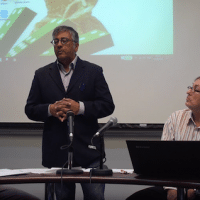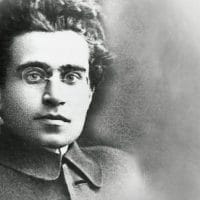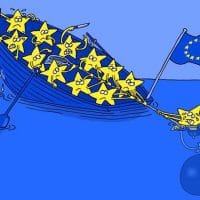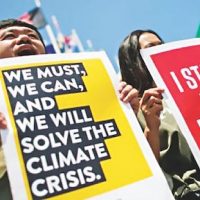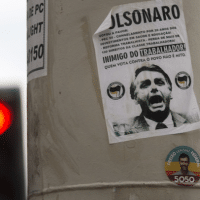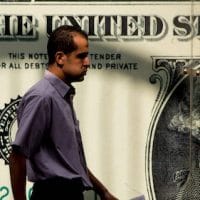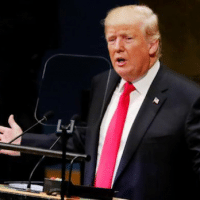-
Plan Oder Markt: the battle of ideas between Austro-Marxism and neoliberalism in Vienna
Co-sponsored by SFU’s Institute for the Humanities, School for International Studies, Department of History, & Department of Sociology and Anthropology.
-
Legacies crucial for the commons
The 150th birth anniversary year of Mohandas Karamchand Gandhi and the 200th birth anniversary of Karl Marx went by this year. Such anniversaries can become occasions of tokenism—for instance, the Indian government has set up a committee with more than 100 members to coordinate celebrations of Gandhi’s anniversary, crammed with political bigwigs from various parties, a few academics and Gandhian workers.
-
Alienation and Freedom
For academics working on Frantz Fanon Alienation and Freedom is no less than a gift. With the publication of this book we finally have the complete available works of Fanon in English. Aptly divided into neat sections – Theatre, Psychiatric Writings, Political Writings, Publishing Fanon, Frantz Fanon’s Library and Life.
-
Antonio Gramsci and the Modern Prince
In this period of global crises and ferment, radical and revolutionary activists are reaching for modes of organization and political practice that can help advance their struggle for human liberation. For growing numbers, the political and organizational perspectives of Vladimir Ilyich Lenin are becoming a pole of attraction–providing an increasingly desired coherence and revolutionary edge.
-
Radical black feminism and the simultaneity of oppression
As the word intersectionality falls from the lips of Hillary Clinton and increasingly is normalized and sanitized, we should be clear about its radical moorings.
-
Facing the left-wing challenge in the European Union
One of the central and most concrete themes that the break should cover concerns the way public indebtedness is used to justify austerity policies.
-
Humanity faces simultaneous climate disasters: study
The future risk of dealing with multiple climate impacts at once depends on geography and whether humanity succeeds in rapidly drawing down greenhouse gas emissions.
-
Jorit, artist behind Che Guevara, Ahed Tamimi mural: ‘graffiti is the voice of protest’
Italian street artist Jorit Agoch unveiled one of the largest and most impressive murals of the Latin American revolutionary Ernesto ‘Che’ Guevara days ahead of the 51st anniversary of his assassination at the hands of the Bolivian army in La Higuera, Bolivia.
-
U.S. Midterms: Native Americans unyielding battle against voter suppression
Earlier this month, the U.S. Supreme Court upheld a ruling that requires North Dakota voters to provide an I.D. with a residential address. The ruling has effectively made the process to vote next to impossible for Native Americans, who by-and-large do not have recognized addresses–but that’s not stopping them.
-
Is the answer really ‘in our genes’?
RICHARD DAWKINS, author of one of the best known texts on human nature, The Selfish Gene, declares we are “machines created by our genes”–that “[w]e are survival machines–robot vehicles blindly programmed to preserve the selfish molecules known as genes.”
-
Socialism frightens Trump White House, publishes ‘red scare’ just before midterm elections
The White House’s Council of Economic Advisers (CEA) released a report earlier this week on “The Opportunity Costs of Socialism,” apparently based on the fact that “coincident with the 200th anniversary of Karl Marx’s birth, socialism is making a comeback in American political discourse,” even though Marx’s birth was in May (1818).
-
Brazil Elections: a conversation with social leader Frei Betto
The second round of elections in Brazil will take place Oct. 28, and this time two opponents will face off. On the one side is Fernando Haddad from the Workers’ Party (PT) who promises to continue the project started by Luiz Inacio Lula da Silva and Dilma Rousseff.
-
The most potent weapon in the hands of the oppressor is the mind of the oppressed
Mike Peters explores the legacy of Steve Biko, a radical who spent his life fighting for Black liberation and for the overthrow of the Apartheid government in South Africa.
-
Yes, ExxonMobil and Chevron are still distorting climate science
If you look at headlines from the last year, ExxonMobil, Chevron and other major fossil fuel companies have seemingly turned a new page on climate change.
-
Trump and Bolton’s new motto: how I started to stop worrying and love the bomb
The key issue is the U.S.’s desire to return to the 90’s status of the world’s sole hegemon.
-
Bolsonaro’s son threatens violence if his father is blocked from Brazil’s presidential race
FAR-RIGHT Brazilian presidential candidate Jair Bolsonaro’s son has threatened violence against the country’s Supreme Electoral Court (TSE) if it blocks his father from running in Sunday’s second-round poll.
-
Deadly, cowardly U.S. drone wars in Africa
War is romantic only when it is limited to the confines of a sanitized imagination. Movies that portray heroic soldiers vanquishing demonic enemy combatants or rescuing fallen comrades may whip up jingoistic war fever, but horrific images of real children and elders maimed, scarred, dismembered and killed during armed conflicts have the power to end wars.
-
Global de-dollarization spells jolts and crises for U.S. economy
The Trump administration’s bellicosity has combined with the volatility of the global economy to sharply accelerate what has become an international movement: ditching the dollar as the world’s reserve currency.
-
Donald Trump at the UN: a speech full of attacks on Iran, Venezuela, and its Cuban allies
“All nations of the world should resist socialism and the misery that it brings to everyone,” the U.S. President stated, in what was a cynical and absurd speech, with all the rhetoric of the Cold War.
-
Pan-Africanism conference charts course towards a socialist continent
The hundreds of delegates who met in Ghana held discussions on five major themes that are of prime importance in the struggle against capitalism and imperialism.

